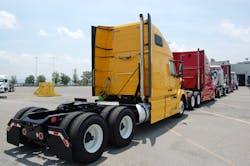A slight dip in commercial vehicle orders in February isn’t changing many expectations for a year of robust demand, especially for Class 8 models, according to several analysts.
“One only has to look at an order graph to see than in any given month orders can fall well above, or well below expectations,” noted Kenny Vieth, president and senior analyst with ACT Research Co.
“The list of reasons trucks are purchased remains positive from top to bottom, and the industry’s backlog of unbuilt orders is deep,” he explained. “To that end, we continue to expect that Class 8 demand will be very strong this year.”
In fact, ACT recently adjusted its “cycle peak” for truck capacity outward to 2014, which is one reason the firm expects the current cycle of demand for commercial vehicles to stay strong for at least another two years.
That conclusion is echoed by some of the results from Frost & Sullivan’s annual heavy duty fleet manager survey, which polled 100 top U.S. private and for-hire fleets.
Sandeep Kar, Frost & Sullivan’s global director of commercial vehicle research, told Fleet Owner that 62% of the fleet managers in the survey said they plan to buy new trucks within six months, with a further 28% expecting to buy new equipment in the next six to 12 months.
“That means there is still a lot of buying activity going on among the top fleets in the industry,” Kar said.
That’s particularly good news for Class 8 truck makers as 86% of those top 100 fleets polled by Frost & Sullivan are on-highway operations, with 93% of them possessing Class 8 units.
Interestingly, Kar said that while fuel efficiency remains a top concern among most of the fleet executives and managers that responded to the survey between December 2011 and January 2012, reliability is deemed the most critical equipment attribute of them all.
“Fuel efficiency is a more transitory factor because, of course, fuel prices fluctuate,” Kar explained. “Reliability and how it factors into the total cost of operation (TCO) is far more critical. That’s because most of those we surveyed are planning to keep equipment longer.”
That’s one reason why 82% of its fleet managers cited the use of advanced engine oils as one of the new powertrain technologies that will be most important to them going forward. “It comes down to reducing operation cost, and advanced engine oils with longer life and longer drain intervals translates into more use, less downtime, and better protection over a longer ownership period,” Kar said. “They cost a little more, but the value they offer is huge.”
About the Author
Sean Kilcarr
Editor in Chief
Sean Kilcarr is a former longtime FleetOwner senior editor who wrote for the publication from 2000 to 2018. He served as editor-in-chief from 2017 to 2018.
